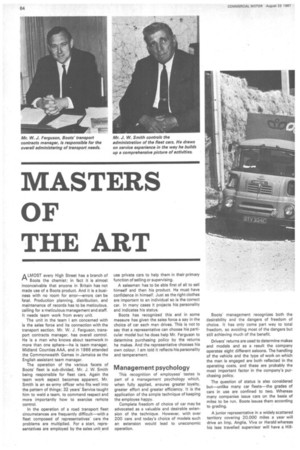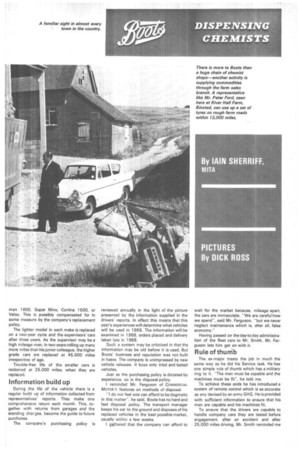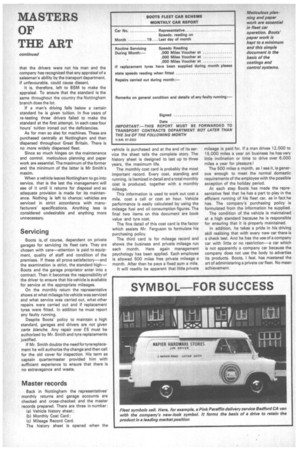MASTERS OF THE ART
Page 66

Page 67

Page 68

If you've noticed an error in this article please click here to report it so we can fix it.
ALMOST every High Street has a branch of Boots the chemist; in fact it is almost inconceivable that anyone in Britain has not made use of a Boots product. And it is a business with no room for error—errors can be fatal. Production planning, distribution, and maintenance of records has to be meticulous, calling for a meticulous management and staff. It needs team work from every unit.
The unit in the team I am concerned with is the sales force and its connection with the transport section. Mr. W. J. Ferguson, transport contracts manager, has overall control. He is a man who knows about teamwork in more than one sphere—he is team manager, Midland Counties AAA, and in 1966 attended the Commonwealth Games in Jamaica as the English assistant team manager.
The operation of the various facets of Boots' fleet is sub-divided, Mr. J. W. Smith being responsible for fleet cars. Again the team work aspect becomes apparent. Mr. Smith is an ex-army officer who fits well into the pattern of things; 32 years' Service taught him to weld a team, to command respect and more importantly how to exercise remote control.
In the operation of a road transport fleet circumstances are frequently difficult—with a fleet composed of representatives' cars the problems are multiplied. For a start, representatives are employed by the sales unit and use private cars to help them in their primary function of selling or supervising.
A salesman has to be able first of all to sell himself and then his product. He must have confidence in himself. Just as the right clothes are important to an individual so is the correct car. In many cases it projects his personality and indicates his status.
Boots has recognized this and in some measure has given the sales force a say in the choice of car each man drives. This is not to say that a representative can choose his particular model but he does help Mr. Ferguson to determine purchasing policy by the returns he makes. And the representative chooses his own colour. I am told it reflects his personality and temperament.
Management psychology
This recognition of employees' tastes is part of a management psychology which, when fully applied, ensures greater loyalty, greater effort and greater efficiency. It is the application of the simple technique of keeping the employee happy.
Complete freedom of choice of car may be advocated as a valuable and desirable extension of the technique. However, with over 200 cars and today's choice of models such an extension would lead to uneconomic operation. Boots' management recognizes both the desirability and the dangers of freedom of choice. It has only come part way to total freedom, so avoiding most of the dangers but still achieving much of the benefit.
Drivers' returns are used to determine makes and models and as a result the company operates eight different saloons. The handling of the vehicle and the type of work on which the man is engaged are both reflected in the operating costs, and these are probably the most important factor in the company's purchasing policy.
The question of status is also considered but—unlike many car fleets—the grades of cars in use are confined to two. Whereas many companies issue cars on the basis of miles to be run, Boots issues them according to grading.
A junior representative in a widely scattered territory covering 20,000 miles a year will drive an Imp, Anglia, Viva or Herald whereas his less travelled supervisor will have a Hill man 1600, Super Minx, Cortina 1500, or Velox. This is possibly compensated for in some measure by the company's replacement policy.
The lighter model in each make is replaced on a two-year cycle and the supervisors' cars after three years. As the supervisor may be a high mileage man, in two years rolling up many more miles than his junior colleague, the higher grade cars are replaced at 45,000 miles irrespective of age.
Trouble-free life of the smaller cars is reckoned at 25,000 miles, when they are replaced.
Information build up
During the life of the vehicle there is a regular build up of information collected from representatives' reports. They make one comprehensive return each month. This, together with returns from garages and the standing charges, become the guide to future purchases.
The company's purchasing policy is reviewed annually in the light of the picture presented by the information supplied in the drivers' reports. In effect this means that this year's experiences will determine what vehicles will be used in 1969. The information will be examined in 1968, orders placed and delivery taken late in 1968.
Such a system may be criticized in that the information may be old before it is used. But Boots' business and reputation was not built in haste. The company is unimpressed by new vehicle releases. It buys only tried and tested vehicles.
Just as the purchasing policy is dictated by experience, so is the disposal policy.
I reminded Mr. Ferguson of COMMERCIAL MOTOR'S features on methods of disposal.
"I do not feel one can afford to be dogmatic in this matter", he said. Boots has no hard and fast disposal policy. The transport manager keeps his ear to the ground and disposes of his replaced vehicles in the best possible market, usually within a few weeks.
I ga,thered that the company can afford to wait for the market because, mileage apart, the cars are immaculate. "We are careful how we spend", said Mr. Ferguson, "but we never neglect maintenance which is, after all, false economy."
Having passed on the day-to-day administration of the fleet cars to Mr. Smith, Mr. Ferguson lets him get on with it.
Rule of thumb
The ex-major treats the job in much the same way as he did his Service task. He has one simple rule of thumb which has a military ring to it. "The men must be capable and the machines must be fit", he told me.
To achieve these ends he has introduced a system of remote control which is as accurate as any devised by an army GHQ. He is provided with sufficient information to ensure that his men are capable and his machines fit.
To ensure that the drivers are capable to handle company cars they are tested before engagement, after an accident and after 25,000 miles driving. Mr. Smith reminded me that the drivers were not his men and the company has recognized that any appraisal of a salesman's ability by the transport department, if unfavourable, could cause dissent.
It is, therefore, left to BSM to make the appraisal. To ensure that the standard is the same throughout the country the Nottingham branch does the lot.
If a man's driving falls below a certain standard he is given tuition. In five years of re-testing three drivers failed to make the standard at the first attempt. In each case four hours' tuition ironed out the deficiencies.
As for men so also for machines. These are purchased centrally at Nottingham and then dispersed throughout Great Britain. There is no more widely dispersed fleet.
Since so much hinges on the maintenance and control, meticulous planning and paper work are essential. The maximum of the former and the minimum of the latter is Mr Smith's maxim.
When a vehicle leaves Nottingham to go into service, that is the last the management will see of it until it returns for disposal and so adequate provision is made for its maintenance. Nothing is left to chance; vehicles are serviced in strict accordance with manufacturers' specifications, Anything less is considered undesirable and anything more unnecessary.
Servicing
Boots is, of course, dependent on private garages for servicing its fleet cars. They are chosen with care—attention is paid to equipment, quality of staff and condition of the premises. If these all prove satisfactory—and the examination is strict, the standard high— Boots and the garage proprietor enter into a contract. Then it becomes the responsibility of the driver to ensure that his vehicle is available for service at the appropriate mileages.
On the monthly return the representative shows at what mileage his vehicle was serviced and what service was carried out, what other repairs were carried out and if replacement tyres were fitted. In addition he must report any faulty running.
Despite Boots' policy to maintain a high standard, garages and drivers are not given carte blanche. Any repair over E5 must be authorized by Mr. Smith and tyre replacements justified.
If Mr. Smith doubts the need fortyrereplacement he will authorize the change and then call for the old cover for inspection. His term as captain quartermaster provided him with sufficient experience to ensure that there is no extravagance and waste.
Master records
Back in Nottingham the representatives' monthly returns and garage accounts are checked and cross-checked and the master records prepared. There are three in number: (a) Vehicle history sheet ; (b) Monthly Cost Card ; (c) Mileage Record Card.
The history sheet is opened when the vehicle is purchased and at the end of its service the sheet tells the complete story. The history sheet is designed to last up to three years, the maximum life.
The monthly cost card is probably the most important record. Every cost, standing and running, is itemized in detail and a total monthly cost is produced, together with a monthly mileage.
This information is used to work out cost a mile, cost a call or cost an hour. Vehicle performance is easily calculated by using the mileage fuel and oil consumption figures. The final two items on this document are book value and tyre cost.
The fine detail of this cost card is the factor which assists Mr. Ferguson to formulate his purchasing policy.
The third card is for mileage record and shows the business and private mileage run each month. Here again management psychology has been applied. Each employee is Mowed 500 miles free private mileage a month. After then he pays a fixed sum a mile.
lt will readily be apparent that little private mileage is paid for. If a man drives 12,000 to 15,000 miles a year on business he has very little inclination or time to drive over 6,000 miles a year for pleasure!
The 500 miles a month, as I see it, is generous enough to meet the normal domestic requirements of the employee with the possible exception of the holiday period.
At each step Boots has made the representative feel that he has a part to play in the efficient running of his fleet car, as in fact he has. The company's purchasing policy is formulated from the information he supplied.
The condition of the vehicle is maintained at a high standard because he is responsible for ensuring that it is properly maintained.
In addition, he takes a pride in his driving skill realizing that with every new car there is a check test. And he has the use of a company car with little or no restriction—a car which is not apparently a company car because the company does not use the body to advertise its products. Boots, I feel, has mastered the art of administering a private car fleet. No mean achievement.












































































































